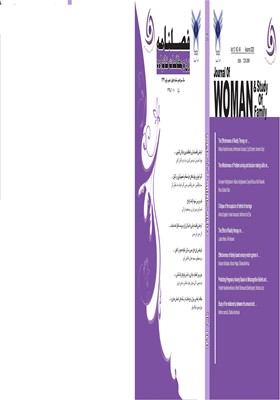Effectiveness of family-based sensory-motor games in decrease of clinical symptoms in ADHD children
Subject Areas : Woman and family
Maryam Mostafavi
1
![]() ,
Masod Hejazi
2
,
Gholamali Afrouz
3
,
Masod Hejazi
2
,
Gholamali Afrouz
3
1 - Ph.D. in Psychology and Education of Exceptional Children. Islamic Azad University. Science and Research Branch, Tehran. Iran.
2 - * Associate Professor. Department of Psychology and Education of Exceptional Children, Faculty of Humanities, Islamic Azad University. Zanjan. Iran
Masod1357@yahoo.com
3 - Distinguished Professor. Department of Psychology and Education of Exceptional Children. Faculty of Psychology and Educational science. University of Tehran. Iran
Keywords: Sensory-Motor Games, Family Based Intervention, ADHD Children,
Abstract :
The present research is aimed at determining the effectiveness of family sensory-motor games in decrease of clinical symptoms in children with attention deficit/ hyperactivity disorder (ADHD). This research is a semi-experimental study with pretest-posttest design and control group. The research population includes all the children (of 8-11 years old) in Zanjan during the academic year 2017-2018. 4 schools were selected from districts 1 and 2, Zanjan by cluster (random) sampling. 20 students were selected out of those who were affected by attention deficit/hyperactivity disorder. After homogenizing the samples in terms of age, gender, and ADHD severity, they were assigned to experiment (10 people) and control (10 people) groups. ADHD diagnosis was done based on Snap and Conners’ IV parent scale. The subjects of the experimental group participated in family sensory-motor games for 8 weeks (sixteen 90-min sessions). Collected data were analyzed through covariance analysis . The results suggested that the performed interventions have significantly decreased the clinical symptoms of ADHD children (with the affect intensity of 0.88) in Experimental group. It can be concluded that this intervention can effectively decrease the symptoms of children with ADHD.
1) Abedi Shahabadi, S. Poormohammadrezaye Tajrishi, M. Mohammadkhani, P. Farzi, M. Effectiveness of Group Training Positive Parenting Program (Triple-P) on Parent-Child Relationship in Children with Attention Deficit/ Hyperactivity Disorders. Journal of Clinical Psychology. 2012; 3 (15); 63-75. [Persian].
2) Douglas, Ann. Parenting Through the Storm: Find Help, Hope, and Strength When Your Child Has Psychological Problems. The Guildford Press, New York. 2017.
3) Hill C, Waite P, Creswell C. Anxiety disorders in children and adolescents. Pediatrics and Child Health.2016; 26(12):548-53.
4) Chronis-tuscano,A,M., Lewis-Morraty,E,woods , k ,o'Brien,K,A., Mazursky-Horowitz, H., & Thomas, S.R.. (2014).
5) Bratton, S.C., & Dafoe, E.C. Play therapy-encyclopedia of mental health (second edition). 2016. 278- 283.
6) Ferreira, J.M., Makinen, M., & Amorim, K.D.S. Intellectual disability in kindergarten: possibilities of development through pretend play. Procedia-social and Behavioral Sciences. 2016. 217(1): 487-500.
7) Halperin, J.M., & Healey, D.M. The influence of environment enrichment, cognitive enhancement, and physical exercise on brain development: can we alter the developmental trajectory of ADHD. Neuroscience and Bio Behavioral Reviews, 2011. 35(1): 621-634.
8) Yuen, T., Landreth, G., & Baggerly, J. Filial therapy with immigrant Chinese families. International Journal for Play Therapy, 2002. 11(2), 63-90.
9) Barkley. R. A. Deficient emotional self-regulation is a core symptom of ADHD. 2013.
10) Landreth,G. Bratton, S. (2006). Child parent relationship therapy (CPRT): A 10-session filial therapy model. Newyork: Routledge.
11) RajabPoor, M. Makvand Hosseini, Sh. RafieNia, P. Effectiveness of group therapy on parent-child relationship on preschool children's aggression. Journal of clinical psychology. 2012; 4 (3). [Persian].
12) Rahimi Pardanjani, S. Ghobari Bonab, B. Afrooz, Gh. Faramarzi, S. Effectiveness of timely family-based intervention based on localized play therapy on clinical symptoms in children with attention deficit / hyperactivity preschool. Journal of family research. 2016; 45 (12); 53-68. [Persian].
13) PeimanNia, B. PoorSharifi, H. Mahmood Alilof, M. Determining the effectiveness of parent-child relationship group therapy on improving the symptoms of conduct disorder in primary school children in Ahvaz. Journal of psychological achievements. 2013; 2 (4); 141-160. [Persian].
14) Taklavi, S. The effect of mothers' play therapy training on children's behavioral problems with learning disabilities. Journal of learning sidabilities.. 2011; 1 (1); 44-59. [Persian].
15) Ganji, K. Zabihi, R. Khodabakhsh, R. Croskian, A. Effectiveness of Child-Based Play Therapy in decrease of behavioral symptoms of ADHD children. Journal of clinical psychology. 2011; 4 (3); 15-25. [Persian].
16) HosseinZadeh Maleki, Z. Mashhadi, Ali. SoltaniFar, A. Moharreri, F. Ghanayi ChamanAbad, A. Working memory training, Barclays parental education program and the combination of these two interventions on improving working memory of children with attention deficit / hyperactivity disorder. Journal of Cognitive science news.. 2013; 15 (4); 53-63. [Persian].
17) Ratey, J. J, & Hagerman, E. Spark: The Revolutionary New Science of Exercise and the Brain. New York: Little, Brown and Company. 2008.
18) Rezazadeh, M. Kalantari, M. Neshatdoost, H. The impact of educational games on focusing attention on reducing the severity of attention deficit disorder / hypoxia disorder. Journal of psychology. 2007; 11 (3); 352-337. [Persian].
19) Sadr Alsadat, S.J. Houshyari, Z. Sadr Alsadat, L. Determination of psychometrics index of SNAP-IV rating scale in parents execution. Journal of Rehabilitation. 2008. 3(31). 59-65. [Persian].
20) Barkley. R. A. Behavioral inhibition, sustained attention, and executive functions: Constructing a unifying theory of ADHD. Psychological Bulletin, 1997. 121(1), 65-94.
21) Barkley. R. A. Journal of ADHD and the nature of self-control. New York: Guilford. 2005.
22) Landreth,G. Play therapy: The art of the relationship. NewYork. NY: Routledge. 2002.
23) Luchrino.L., Mancini, F., & Mercurio, C. Parent-training intervention among a group of children with ADHD Child and Adolescent Psychiatry.2011. 4(1): 397-398.
24) MR coleman, G Gallagher, S Kirk. Children exceptional Educating;Elsevier:York new
25) Andrea C-T. Erin, L. Sharon R. Th. Parent-child interaction therapy with emotiom coachingfor preschoolers with ADHD disorder. Journal of Cognitive and behavioral practice, 2016. 23(1) 4-17.
_||_

